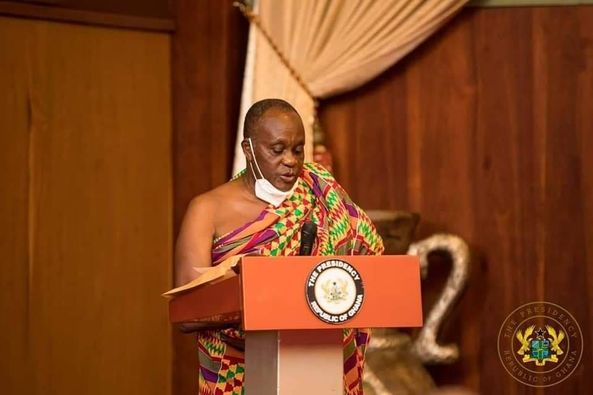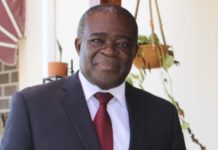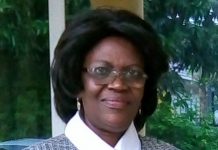|
Getting your Trinity Audio player ready...
|
The Omanhene of Asante Juaben, Nana Otuo Siriboe II, has been re-elected the Chairman of the Council of State for the second term of President Nana Addo Dankwa Akufo-Addo.
At its maiden meeting held at the Accra International Conference Centre yesterday, Nana Otuo Siriboe was nominated by Mr Sam Okudzeto and was seconded by 10 other members, leading to his unanimous election.
Context
Nana Otuo Siriboe, who chaired the seventh Council of State, was credited with the re-engineering of the operations of the Council of State, which culminated in the passage of the Council of State Act, 2020 (Act 1037) to which the
President gave his assent on December 23, 2020.
The act among other things provides for the establishment of a secretariat and other relevant structures for the attainment of the mandate of the council.
Nana Otuo Siriboe was a member of the Council of State in the administration of President John Agyekum Kufuor from 2001 to 2009 and was unanimously elected as Chairman of the seventh council under President Akufo-Addo.
Acceptance
Speaking after his re-election, Nana Otuo Siriboe thanked his colleagues for the confidence reposed in him and gave an assurance that he would provide an avenue for consensus building and quality leadership that would help the council in executing its mandate.
Background
Nana Otuo Siriboe is an Electrical Engineer by profession and graduated from the then University of Science and Technology, Kumasi, in 1969 with a bachelor’s degree in Electrical Engineering.
Nana has a record of long service to the nation. He was a key member of the Constituent Assembly of 1979 and the Consultative Assembly of 1992 which drafted the 1979 and 1992 Republican Constitutions respectively.
He once chaired the Komfo Anokye Teaching Hospital Board, and the Kwame Nkrumah University of Science and Technology (KNUST) Council.
He has also served as a member of several other Boards including the Lands Commission, the Ghana Trade Fair Authority, the Prisons Service Council and Anglogold Ashanti.
In private life Nana Otuo Siriboe has been a farmer and an industrialist. In 2015 he was adjudged the best large-scale oil palm farmer in Ghana.
His agro-processing company, Juaben Oil Mills Limited, employing about four hundred people, is the largest indigenously owned oil palm processing facility in the country.
Its operations span from processing raw palm fruit bunches into crude palm oil and palm kernel oil and further refining same into bleached, deodorised cooking oil, palm stearin and palm fatty acid distillate.
The waste products of the operations of the company, viz. palm fibre, empty fruit bunches and palm shells are converted into electricity for the factory’s operations.
In 2003, Nana Otuo Siriboe’s alma mater, KNUST, awarded him an honorary doctorate degree (Honoris Causa) for outstanding leadership in traditional governance and contributions to agriculture and agro-industrial development.
Again, in 2007, the Government of Ghana conferred on him the Order of the Star of Ghana, the highest award the nation bestows on its citizens who have distinguished themselves in their respective fields of endeavour and have made profound contributions to the progress of the nation.
Ghana takes delivery of 600,000 doses of COVID-19 vaccine
Ghana Wednesday morning took delivery of 600,000 doses of the AstraZeneca COVID-19 vaccine made by the Serum Institute of India (Covishield).
The 600,000 doses is the first consignment of vaccines acquired through the COVID-19 Vaccine Global Access Facility (COVAX) which Ghana, among 92 countries, has signed unto.
Ghana is the first country in the world to receive COVID-19 vaccines as part of the COVAX initiative to ensure equitable access for everyone.
The vaccines arrived at the Kotoka International Airport on an Emirates Airlines cargo flight and were received by a delegation led by the Minister designate for Health, Mr Kwaku Agyeman-Manu.
The COVID-19 vaccination will begin on March 2 and will be conducted in phases among segmented populations.
The first segment of the population that will receive from the doses will be health workers, adults 60 years and over, people with underlying health conditions, frontline executive, legislature, judiciary and their related staff, frontline security personnel, some religious leaders, essential workers, teachers and other personalities in Greater Accra Metro including Awutu Senya and Awutu Senya East in the Central Region.
A similar segmented population in the Greater Kumasi Metro and Obuasi municipality will also be covered. A statement from the Ministry of Information said, “the Government of Ghana remains resolute at ensuring the welfare of all Ghanaians and is making frantic efforts to acquire adequate vaccines to cover the entire population through bilateral and multi-lateral agencies. We urge you to do your part by ensuring that you get vaccinated when the vaccine gets to you.”
It also acknowledge the hard work of the technical teams from the Ghana Health Service, the Ministry of Health, the Ministry of Information, the COVID-19 Task Force and all those who have assisted in getting us this far.
Our Development Partners are also acknowledged for their tremendous financial and technical support. It is our hope that they will continue to support us in our sustained efforts in combating this virus and putting COVID-19 behind us, the statement added.
Momentous occasion
A joint statement by the World Health Organisation (WHO) and the United Nations Children’s Fund (UNICEF), said the delivery of the vaccines to Ghana was a “momentous occasion”.
“The arrival of the Covid-19 vaccines into Ghana is critical in bringing the pandemic to an end,” they said.
The WHO and Unicef said the shipment represented “part of the first wave of Covid vaccines headed to several low and middle-income countries”.
Case count
As at February 20, Ghana had recorded 81,245 cases of the Coronavirus disease, out of which 6,614 were active.
Data from the Ghana Health Service (GHS) also indicated that two more persons had died, bringing the total number of deaths to 584.
It said 95 persons were in severe condition, while 29 were critical.














